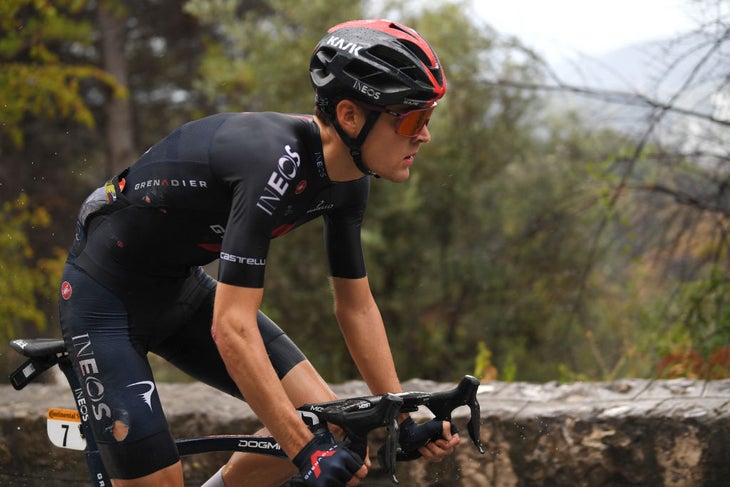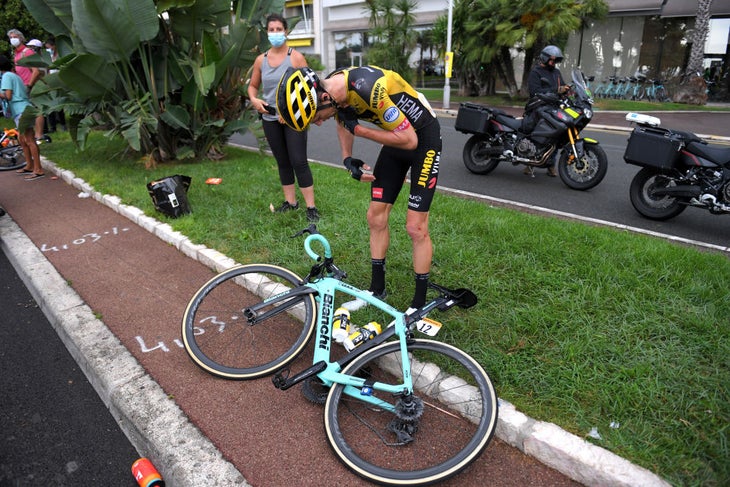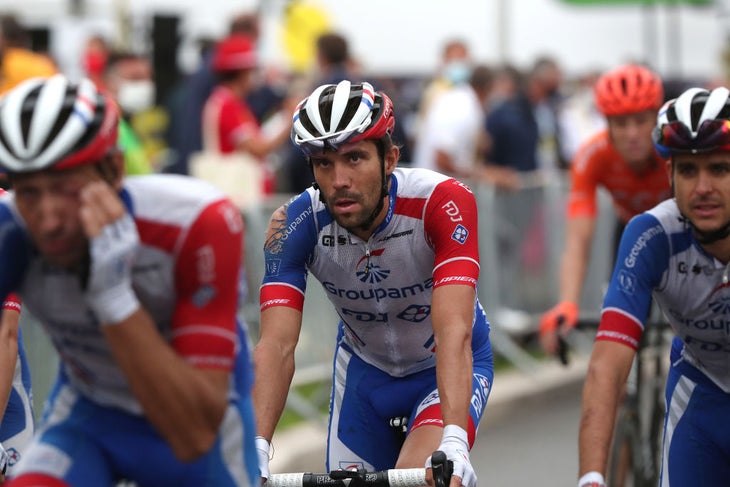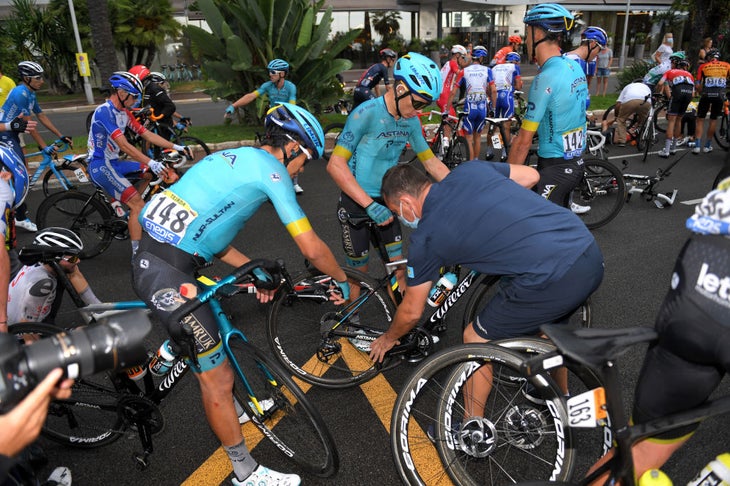NICE, France (VN) — Any first stage of a Tour de France is always nerve-wracking. Saturday stage 1 was no typical opening day.
Nerves, rain, tension, narrow roads and slippery crosswalks added up to a treacherous first day of the 2020 Tour de France. Add a little bit of fright of racing in the midst of a global pandemic, and riders were in for a hard day in the saddle.
“I’ve never seen so many crashes in my life,” said NTT’s Max Walscheid.
“It was like an ice-skating rink,” said Movistar’s Imanol Erviti.
Following months of dry, summer heat, a late-summer shower doused roads in the sinuous, climb-heavy opening stage in the hills above Nice. Oil, dust and painted traffic lines and crosswalks made for a treacherous race.

Riders slipped, sloshed and crashed as the Tour opened Saturday under increased security and health measures due to the COVID-19 pandemic.
“Staying safe wasn’t an easy ask today,” said Bora-Hansgrohe’s Emanuel Buchmann. “It was extremely dangerous and slippery, and nearly half the peloton crashed.”
Pre-race favorite Thibaut Pinot (Groupama-FDJ) almost saw his Tour end before it started when he was caught up in a big crash right at the 3km to-go banner — where the race jury ruled the GC time would be taken — that took down two dozen riders. Pinot was banged up, but team officials said he will remain in the Tour.
Pavel Sivakov (Ineos) got a rude introduction to his first day in his Tour debut, crashing early, and the Russian limped across the line more than 10 minutes back.
A string of early crashes put the peloton on edge. Once it was obvious that the narrow descents and off-camber switchbacks were too slippery under the summer dousing, the riders took matters into their own hands, and called an unofficial truce.

Riders from Jumbo-Visma and Team Ineos moved to the front and initiated an impromptu cease-fire that all but neutralized the descents under pelting rain.
Tony Martin of Jumbo-Visma was among the leaders on the road who urged the peloton to go slow and stay safe.
“Maybe I made the important sign, but it’s an initiative from every team,” Martin said. “Everyone stayed in line and everyone wanted to be safe and go easy on the descent. I am proud about the peloton and how we stayed together.”
In fact, it appears that riders are taking control of this Tour de France in ways they never have before.

Following a string of high-profile crashes as well as the uncertainty and risks of racing during a coronavirus pandemic, riders have created a loose coalition among themselves to help police and patrol the race coming into the 2020 Tour.
Luke Rowe, the veteran on Ineos, said key riders from several teams started discussions between themselves leading into this year’s Tour on how to manage a situation just like today.
Weather and a challenging course design could have made for even more risks if riders hadn’t agreed to neutralize the action on the wet descents.
“We got this rider’s organization or group, with a couple guys on each team, and we spoke about last night about how we are going to approach the Tour in general, and look after each other, and do the right thing when it’s needed,” Rowe said.

If most of the peloton agreed to take it easy, it appeared that Team Astana did not get the memo.
After it appeared a détente was agreed, the team sent three riders to the front, and just as the trio was picking up speed, team captain Miguel Angel López lost control of his rear wheel. As the Colombian Tour rookie struggled to remain upright, he slammed into a retaining wall and sign. He luckily was not seriously injured, and was able to finish the stage.
Astana’s apparent freelancing didn’t go down very well with the peloton’s new patrons.
“I have to say chapeaux to the whole peloton, minus Astana, who decided to go down one climb full-speed,” Rowe said. “As a result, they made themselves look pretty stupid.”
“The only team who didn’t want to follow was Astana, and everyone saw what happened then,” Martin said. “Maybe that’s bad luck, or maybe more.”
It will be interesting to see if the peloton’s loose federation will hold up.
The pack will join forces on occasions like Saturday, when a move to neutralize a few wet descents did not harm anyone’s individual interests.
It’s much harder to control the unbridled ambitions and instincts once the race fully opens up.
